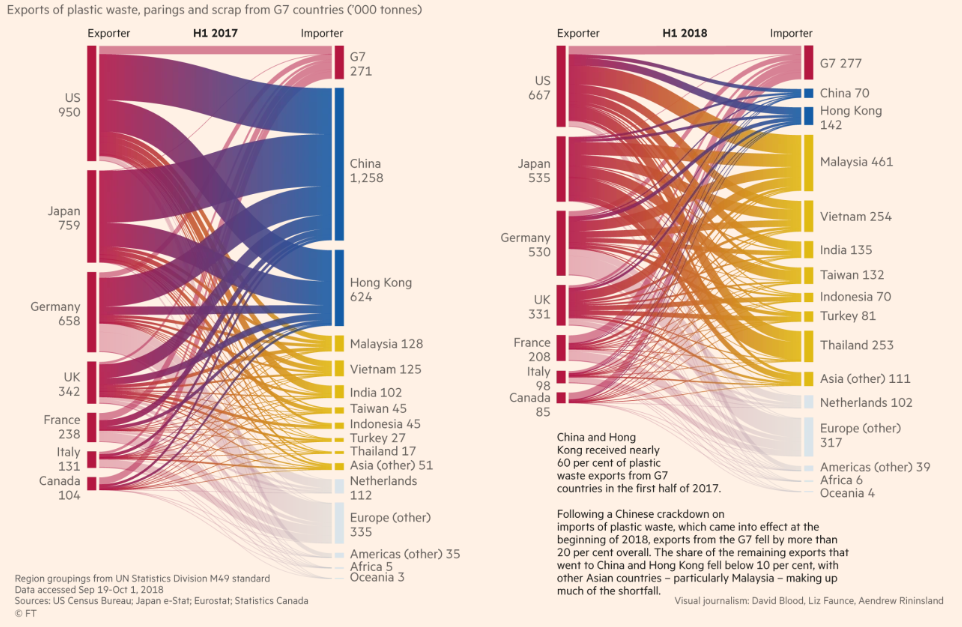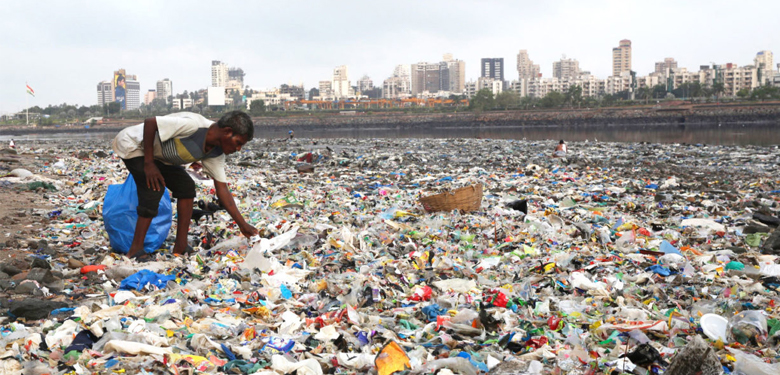Plastic Flows in Flux: Increasing legislation on plastic waste
Over a year after Chinese legislation reducing plastic scrap imports, global flows of plastic waste continue to be in flux. Increasingly governments across Southeast Asia have started to enact measures targeting plastic imports. This article highlights examples of key national legislation on plastic-scrap, along with notable industry initiatives driving private sector involvement in plastics.
The Chinese ‘National Sword’ policy, which announced the cessation of plastic scrap purchases that were not 99.5% pure, disrupted a $200 billion global recycling industry. Prior to this, China imported 2/3 of the world’s plastic waste. China’s decision has pushed the top exporters of plastic scrap waste, including the US, Germany and Japan to find new buyers. Chinese legislation on plastic waste imports has served as an opportunity for recycling industries in Southeast Asia, particularly in Indonesia, Thailand, Vietnam and Malaysia, as demonstrated below.

Source: Financial Times, 2018
Within a few months of China’s ban, Malaysia became the world’s biggest importer of scrap plastic. Vietnam has seen imports double, and Indonesian imports rose 56%. Thailand has seen the largest percentage increase of 1370%. In Thailand, the government has started to implement raids on scrap-processing facilities, dumps and ports to examine the plastic waste being accepted by facilities. Raids found that 95% of imported plastic scrap did not meet governmental regulations.
However, the diversion of plastic waste to countries that lack the recycling capacities of China, has created significant challenges. Illegal plastic scrap recycling facilities have been found by government raids in Thailand, Malaysia and the Philippines, which do not implement environmental or social safety standards, or contribute to government tax revenues. Improper wastewater disposal has led to contaminated water supplies and crop devastation, and hazardous emissions from open-burning and incineration of scrap plastic has led to respiratory illness.
Following community-led grassroots movements protesting plastic imports, several of the new destinations for plastic waste have started to implement restrictions. Both Malaysia and Thailand announced in late 2018, that they would be implementing bans on plastic scrap imports to take place from 2021 onwards. In March 2019, the government of India announced a complete ban on plastic scrap imports, including within Special Economic Zones (SEZs). In Indonesia, Bali implemented a complete ban on all single-use plastics from December 2018, following the emergency closure of beaches inundated with plastic waste. Indonesia is the first country in the region to partner with the Global Plastic Action Partnership (GPAP, following the government’s pledge of spending USD 1 billion per year to address marine plastic pollution. The partnership will develop a data-driven model that substitute materials and increase recycling and waste collection rates.
On 11 May 2019, 187 governments across the world agreed to amend the Basel Convention to include plastic-scrap. As a result of the amendment, all exporting countries will have to obtain prior consent from receiving governments to send contaminated, mixed or unrecyclable plastic waste to private entities. Global monitoring and tracking of plastic waste exports is expected to due to the legislation.
Timeline of plastic waste bans and restrictions
| January 2018 | China implements the ‘National Sword’ policy enforcing plastic restrictions |
| April 2018 | Thailand issues temporary ban on plastic scrap
Malaysia temporarily stops issuing import permits for plastic scrap |
| May 2018 | Thailand lifts temporary ban |
| June 2018 | Malaysia resumes issuing permits
Indian Prime Minister Narendra Modi announces the aim of eliminating all single-use plastic within the country by 2022. |
| July 2018 | Vietnam states new licenses for waste imports will no longer be issued, and it will begin to crack down on illegal shipments
China announces a ban of all imports of “solid waste”, to be in effect by end 2019 |
| August 2018 | Malaysia announces 3-month curtailment of plastic waste permits
Thailand issues ban on 432 types of e-waste |
| October 2018 | Malaysia announces limitations on plastic waste imports, and phasing-out of certain forms of plastic scrap within 3 years
Thailand announces permanent ban of plastic imports to be in place by 2021 Taiwan limits forms of plastic scrap allowed into the country |
| March 2019 | India announces all plastic scrap imports will be banned |
| April 2019 | Vietnamese officials announce ban of plastic scrap imports by 2025 |
| May 2019 | 187 governments across the world agree to amending the Basel Convention to include plastic waste |
Source: ‘Discarded: Communities on the Frontlines of the Global Plastic Crisis’ GAIA, 2019; Resource Recycling, 2018, and The Guardian, 2019
Increasing legislation against plastic waste imports raises the question – where will the waste go now? Innovation along the waste management supply chain is needed to address plastic leakage and pollution. Industry initiatives are increasingly being formed across Asia to address the issue.
In Hong Kong, approximately 2.2 tons of plastic waste is generated daily, with only 14% being recovered and sent for recycling. The Single-Use Beverage Packaging Working Group has developed the Drinks Without Waste initiative, representing a coalition of stakeholders including producers, importers, distributors, retailers, NGOs, and waste management service providers. The multi-stakeholder initiative has committed to reducing single-use beverage packaging in the country, through developing a transparent framework that shares responsibility between institutions.
The Philippine Alliance for Recycling and Materials Sustainability (PARMS) is another example of a multi-stakeholder industry led initiative seeking to address plastic waste across the value chain. PARMS includes junkshops and haulers, critical parties involved in collecting and recycling waste in the Philippines. The premise is to increase recovery and reduce landfill dependence. Corporate partners, including Coca-Cola FEMSA Philippines, Nestle Philippines, Unilever, and Procter & Gamble Philippines committed to the development of a plastic recycling facility that would address low-value plastics sachets. GAIA found that approximately 60 billion single use sachets were disposed of as plastic waste in the Philippines.
CSR Asia continues to provide a platform for engagement and proactive discussion on the issue of plastic waste, and will be holding a dedicated session at the annual CSR Asia Summit. Our Strategic Partner Program convenes leading businesses in the region to facilitate peer learning and exchange of best practices on the region’s most material sustainability challenges. Our series of roundtables on plastics and sustainable packaging connects those who are already working on answers to the plastic challenge in the region and supports the sharing of practical solutions.
To learn more contact us at sp@elevatelimited.com.
